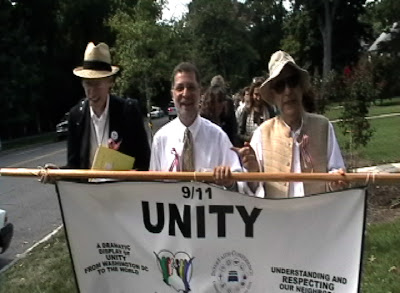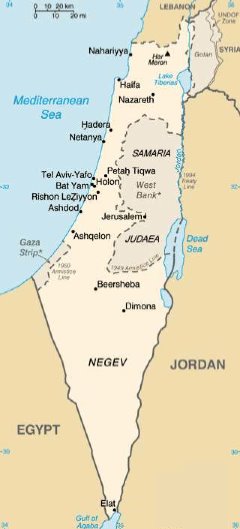Below you will find a short description for the major Palestinian terrorist organizations
al-Aqsa Martyrs Brigades

Affiliation: Fatah; Popular Resistance Committee
Ideology: secular/nationalist
Base of Operations/Leadership: West Bank; Gaza
Brief History: First appeared in 2000, at the beginning of the Second (a.k.a. al-Aqsa) Intifada (uprising). Named after the al-Aqsa Mosque (a.k.a. the Dome of the Rock), which stands at an area that Jews call the Temple Mount (where the First and Second Temples existed in ancient Judea). Formed in reaction to then-Israeli opposition leader Ariel Sharon visiting the Temple Mount. Reportedly received payments from former Palestinian Authority Chairman Yasser Arafat. Is closely connected to Palestinian Authority ("PA") security services, and members likely still receive payments from current PA Chairman Mahmoud Abbas and his government.
Terrorist Incidents:- Jan. 2002 suicide bombing by female in Jerusalem that killed 1 and wounded 40
- Mar. 2002 suicide bombing in Jerusalem cafe that killed 11 and wounded over 50
- Nov. 2002 shooting at Israeli Kibbutz that killed 2 children, 3 adults, and wounded 7
- Jan. 2003 suicide bombings in Tel Aviv that killed 23, wounded over 100
- Jan. 2004 suicide bombing on a bus in Jerusalem that killed 11 and wounded 30
- Mar. 2004 suicide bombing in Ashdod that killed 11
- 78 separate rocket attacks between Apr. 2005 and Mar. 2007
Army of Islam
Affiliation: Popular Resistance Committee; influence by al-Qaeda
Ideology: Islamist
Base of Operations/Leadership: Gaza Strip
Brief History: First appeared in 2006. Leadership comes from the Dagmoush clan, a family in the Gaza Strip known for extortion, smuggling, and arms-dealing. Has variously coordinate and clashed with armed groups from Fatah and Hamas. Has demanded the release of leaders of al-Qaeda in return for freeing hostages.
Terrorist Incidents:
- June 2006 kidnapping of Israeli Defense Forces Cpl. Gilad Shalit, killing 2 others
- Mar. 2007 kidnapping of BBC Reporter Alan Johnston
Democratic Front for the Liberation of Palestine (DFLP)
(DFLP)
Ideology: Secular/Marxist-Leninist
Base of Operations/Leadership: West Bank; Gaza Strip; Damascus, Syria
Brief History: The DFLP split from the Popular Front for the Liberation of Palestine ("PFLP") in 1969 over leadership dispute. Emphasizes international Marxism over Palestinian nationalism. Rejected the 1993 Oslo Accords with Israel, though has since accepted them.
Terrorist Incidents:
- 1974 guerrilla attack of school in Ma'alot killing 27 (mostly children), wounding 134
- 1977 bombings in Jerusalem and Tel Aviv
- 1984 grenade attack in Jerusalem, wounding 21
- 1985 bus attack near Hebron
- 1988 gasoline bombing of the car of then-Industry and Trade Minister Ariel Sharon
- Nov. 2006, fired 3 rockets in Israel, no casualties
Iz ad-Din al-Qassam Brigades

Affiliation: Hamas; Palestinian Resistance Committee
Ideology: Islamist
Base of Operations/Leadership: West Bank; Gaza Strip
Brief History: Established in 1987 as an offshoot of the Egyptian Muslim Brotherhood and as a major player in the First Intifada (uprising). Is dedicated to the destruction of Israel, and replacing it with an Islamic state. It's political wing, Hamas, initially refused to be part of the Palestinian Authority ("PA") because the PA was created after the 1993 Oslo Accords with Israel. Major player in the Second (Al-Aqsa) Intifada. Decided to participate in 2006 PA parliamentary elections, where it received a majority and formed a new government. Formed unity government with Fatah in early 2007 in attempt to end international boycott of PA. Ousted Fatah from Gaza Strip in June 2007 in violent military coup.
Terrorist Incidents:- Since 1993, various suicide bombings, rocket attacks, and small arms fire that have killed over 500.
Palestinian Islamic Jihad (PIJ)
Affiliation: Hezbollah; Iranian Revolutionary Guards
Ideology: Islamist
Base of Operations/Leadership: West Bank; Gaza Strip; Damascus, Syria; Lebanon
Brief History: Formed in late 1970's as an offshoot of the Egyptian Muslim Brotherhood. Believed the Brotherhood had become to moderate. Seeks the destruction of Israel and the replacement with a Mideast pan-Islamic empire. Even though it is a Sunni group, receives funding from Iran (a Shi'a country). Frequently coordinates attacks with Hamas.
Terrorist Incidents:
- Since 1988, various shooting, suicide bombings, firebombings, rocket/missile attacks
- Between May 2005 and Feb. 2007, responsible for 18 dead and 186 wounded
Popular Front for the Liberation of Palestine (PFLP)
Ideology: Secular/Nationalist/Marxist-Leninist
Base of Operations/Leadership: West Bank; Gaza Strip; Damascus, Syria
Brief History: Established in 1967 in response to failure of Arab countries to destroy Israel in Six Day War. Seeks to destroy Israel and replace it with Marxist-Leninist Arab state. Rejects the 1993 Oslo Accords and Palestinian Authority. Has received funding from Syria, Iran, and Libya. Pioneered airplane hijacking.
Terrorist Incidents:
- 1968, hijacked El Al airplane.
- 1972, shooting at Lod International Airport, killing at least 24
- 1976, hijacked Air France Airplane, landing it in Entebbe, Uganda. In famous raid, IDF freed 100 hostages, though 3 died
- 2001, shot dead Israeli Tourism Minister Rehavam Ze'evi
- Between 2004 and 2005, responsible for at least 3 deaths and 30 wounded from rocket attacks and suicide bombings
Tanzim

Affiliation: Fatah
Ideology: Secular/Nationalist
Base of Operations/Leadership: West Bank
Brief History: Founded in 1995 in opposition to Islamist groups such as Hamas and Palestinian Islamic Jihad. Also, wanted to ensure that those who had stayed in the West Bank and Gaza after 1967 war maintained a voice in Fatah. Until 1993, Fatah leadership (i.e. Arafat and his associates) was based in Tunisia, and once they came back to the PA had not allowed the younger generation to gain positions of power. Tanzim sought to rectify this. Lead by Marwan Barghouti, who has been in an Israeli prison since 2002 for multiple murder convictions. Barghouti has negotiated several ceasefires between Palestinian factions and Israel, and considered a future contender for Chairman of the PA. There has been speculation that Israel may free Barghouti in order to boost PA Chairman Mahmoud Abbas' Fatah movement.
Terrorist Incidents:
- Between 2000 and 2002, various shootings, stabbings, bombings, suicide bombings, and rocket attacks resulting in at least 26 dead and 100 wounded.
--References--
1976: Israelis Rescue Entebbe Hostages in BBC.com (available at http://news.bbc.co.uk/onthisday/hi/dates/stories/july/4/newsid_2786000/2786967.stm).
Council on Foreign Relations (available at http://www.cfr.org/index.html).
Demands issued on Johnston tape in BBC.com (May 9, 2007) (available at http://news.bbc.co.uk/2/hi/middle_east/6637507.stm).
Yaakov Katz, Vilna'i: Let DFLP leader visit Ramallah in Jerusalem Post Online (July 13, 2007) (available at http://www.jpost.com/servlet/Satellite?cid=1184168556149&pagename
=JPost%2FJPArticle%2FShowFull).
Yaakov Katz, Sneh: Exchange Barghouti for Schalit in Jerusalem Post Online (July 10, 2007) (available at http://www.jpost.com/servlet/Satellite?c=JPArticle&cid=
1183980036224&pagename=JPost%2FJPArticle%2FShowFull).
Elise Labbot, Militants issue Israel hostage demands in CNN.com (June 26, 2006) (available at http://edition.cnn.com/2006/WORLD/meast/06/26/israel.soldier/index.html).
Paul Martin and Martin Fletcher, The moment of greatest danger in Times Online (June 18, 2007) (available at http://www.timesonline.co.uk/tol/news/world/middle_east/article1945825.ece).
MIPT Terrorism Knowledge Base (available at http://tkb.org/Home.jsp).
Aaron D. Pina, Palestinian Factions, Congressional Research Services Report RS 21235 (June 8, 2005) (available at http://www.fas.org/sgp/crs/mideast/index.html).
Profile: DFLP in BBC.com (Feb. 4, 2002) (available at http://news.bbc.co.uk/2/hi/middle_east/1800092.stm).
Statement of Indictment: Marwan bin Khatib Barghouti in Israel Ministry of Foreign Affairs (Aug. 14, 2002) (available at http://www.mfa.gov.il/MFA/MFAArchive/2000_2009
/2002/8/Marwan%20Barghouti%20Indictment%20-%20Appendix-%20Terrorist).
Weapon Survey (available at http://www.weaponsurvey.com/).
World Incidents Tracking System (available at http://wits.nctc.gov/Main.do).
Read More......





















